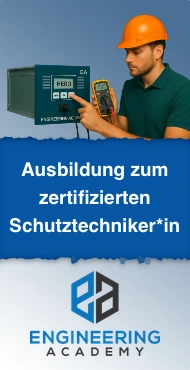EARTfelt Greetings, Dear friends of protection and control engineering! The networking of our readers, i.e. the networking of developers, engineers, suppliers, operators, sellers, programmers, students and young and old is the most important thing, a strong network is the basis of mutual success. That's why we launched our new series "10 questions for: ...". From now on, we will gradually introduce the driving forces of the protection and control engineering world.

We are happy to release our second contribution to this brand new series with Dr.techn. Gernot Druml from Sprecher Automation. Many already know him, but by no means all.
Let's get started with 10 questions for: Dr.techn. Gernot Druml
1. When and where were you born?
I was born in February 1956 in the gunsmith town of Ferlach in Carinthia, the southernmost and most "beautiful" province of Austria.
2. Why did you become an engineer?
When I was 13 years old and was about to confirm, my uncle asked me, which present I had thought up. At that time, it was common to get either a bike or a watch. My wish, however, was an electronics kit from Kosmos. The wish was fulfilled. And so I started spending my time in the basement of my parents' home - not always to the delight of my parents.
3. Which university did you go to?
After attending the Higher Technical College for Telecommunications and Electronics (HTL) in Klagenfurt, I studied electrical engineering at Graz University of Technology. As a field of specialization, I chose control engineering - not just for me a discipline that was dreaded then and today.
At that point in time, I never thought I'd have a career in plant engineering.
4. How did you come to the protection and control technology?
One of my big challenges was the development of the first microprocessor-controlled Petersen coil controller. Initially, this controller was designed as a "lone fighter". In the course of the further spreading of the regulator a networking became necessary. This was done by the control technology, based on T 103.
The quote from Prof. Hans Pundt "The KNOSPE is the capitulation before earth fault location" has made me, also deeper into the earth fault location work - because I did not want to capitulate (KNOPSE = short time grounded star point).
5. What was your biggest personal success at work?
I do not have to think long - no doubt the invention of the qu algorithm.
This algorithm evaluates the transient event at ground fault occurrence and provides 99.9% correct directional displays in cable networks. This method led to the renaissance of the "Wischer" process in the medium-voltage level (Wischer = transient earth procedure).
The company A. Eberle and especially Mr. Lothar Mayer has given me the opportunity to implement this algorithm in products. This confirmed the technical and commercial acceptance by the market and made the qu-procedure a true "innovation".
The further development and adaptation of this procedure to changed network structures as well as the research of new approaches in the field of earth fault distance protection are carried out for Sprecher Automation.
6. In retrospect, would you do things differently?
Only marginal changes.
7. Where do you see the protection and control technology in 2028?
Due to the ever new developments - increasing computer power, new measuring technology, sensors, more accurate timekeeping etc. - it will be possible to realize already known approaches whose implementation still seems visionary today.
A special example is the evaluation of traveling waves for distance measurement of the earth and short circuit.
8. What is your life motto?
Free after Viktor Frankl: Only those who set the impossible to the goal, can achieve the just possible.
9. What can you give or advise to other engineers?
Learn basics !!!!
10. Have we forgotten an important question that we should have asked you?
When will there be a foundation book on earth fault control and location?
Answer: is in progress
Many thanks to Dr.techn. Gernot Druml ;-)























